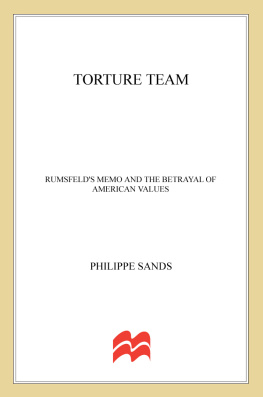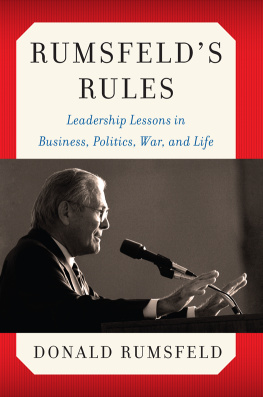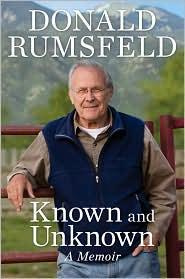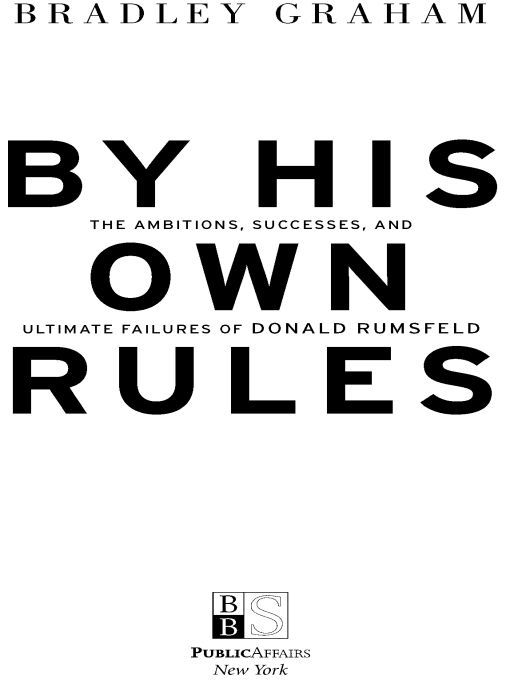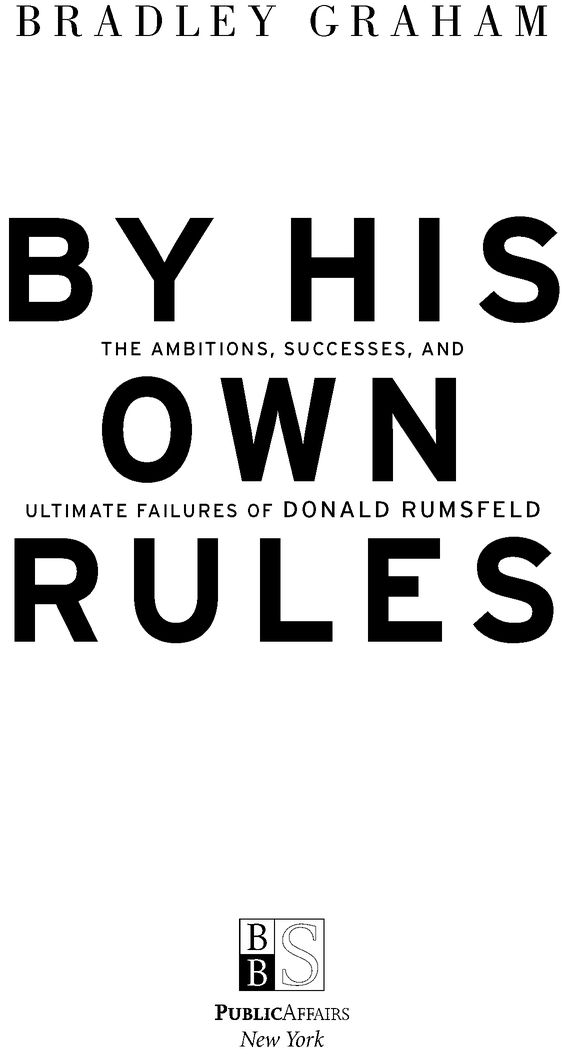Table of Contents
To Seymour and Kalmaine
And to Russell
Introduction
Face time with the president is political gold in Washington, so Donald Rumsfeld moved quickly after taking charge at the Pentagon to secure regular private meetings with President George W. Bush. Now, nearly six years and many meetings later, the defense secretary arrived in the Oval Office prepared to raise a delicate, personal matter.
His opportunity came as talk that day, in September 2006, turned to Iraq. The conflict there was going badly. Violence had metastasized into a civil war. Plans to begin a major drawdown of U.S. troops had stalled. Iraqi forces still appeared unready to assume charge of security, and the Iraqi government, riven by sectarian strife, was doing little to unite the nation. In Washington, much of the blame for the mess in Iraq had fallen on Rumsfeld. He had failed to plan adequately for the occupation, was slow to develop a counterinsurgency campaign, and had alienated too many people with his combative, domineering personality.
By then, Rumsfeld had hung on to office longer than most of his predecessors in the top Pentagon job. But with congressional elections approaching in the fall, he had become a campaign target, vilified by Democrats and considered a political liability by many Republicans. If, as was increasingly anticipated, Democrats won control of one or both chambers of Congress, it would mean more hearings for Rumsfeld and more punishing interrogations. In recent days, Rumsfeld and his wife, Joyce, had discussed the prospect of his stepping down.
We said theres no way he would stay if either the House or the Senate went Democratic because he would be the issue, Joyce recalled months later. The criticism would have been relentless until he was gone.
Sitting with Bush, Rumsfeld broached the possibility of his departure. A fresh pair of eyes on Iraq might not be a bad thing, the secretary remarked. He made no explicit offer to resign. Still, his inference was unmistakable.
Or so the president thought. Although Bush didnt pursue the point, he told a senior White House official afterward what Rumsfeld had said. Bush took the comment as a sign of Rumsfelds own recognition of the political realities closing in on him. In the presidents mind, Rumsfeld had cracked the door open, the official recounted. And whether the president wanted to kick it open or not was up to him.
The question of whether to keep Rumsfeld had dogged Bush and his senior advisers for months. It had been raised after the Abu Ghraib prison scandal in early 2004 and several months later in the wake of Bushs reelection. It had come up again as the Iraq War worsened during 2005, and once more in the spring of 2006 when a number of retired generals stepped forward to appeal for Rumsfelds dismissal.
Each time, Bush resisted letting Rumsfeld go, even rebuffing several suggestions that he do so by his own chief of staff, Andrew Card, and other senior aides and advisers. Bush had still valued Rumsfelds counsel and also worried that the disruption caused by replacing a secretary in wartime could be risky. Moreover, Rumsfeld had been unfailingly loyal to the president, and he had a powerful ally in Vice President Richard Cheney, who owed his own rise in the administrations of Richard Nixon and Gerald Ford four decades earlier to Rumsfeld. Cheney and his aides liked Rumsfelds hard-charging style and argued that the secretary had been right on a number of things where others had been wrong.
Importantly, too, the Pentagon leader had championed the administrations signature drive to reform the U.S. military. From the beginning of his tenure, he had proclaimed transformation his main slogan and had pushed to create a more agile, adaptable military. He had relentlessly challenged existing assumptions and had advocated new principles of warfare, insisting on the need for change in confronting new and evolving threats to the United States.
He had taken on the Army early, its heavy forces and cumbersome deployments standing as a symbol of the bureaucratic inertia he was determined to overcome. Eventually during his tenure, the Army was restructured into more flexible, more easily deployable units. And he had pressed all the servicesArmy, Air Force, Navy, and Marine Corpsto work more cooperatively. Before Rumsfeld was finished, his constant churning had led to a rewriting of U.S. war plans to emphasize speed and fewer troops, a repositioning of U.S. forces around the world to shrink bases in Europe and Asia that dated from the Cold War, and a rearrangement of the militarys regional and functional commands to fill gaps and adjust to new dangers.
Outside the Pentagon, in interagency deliberations, he had emerged as a forceful conservative voice on a range of national security policies and a fierce guardian of what he considered military prerogatives. Publicly, he had performed as the administrations most spirited spokesman, sparring sharply with the media. All in all, Rumsfeld had become the most powerful secretary of defense since Robert S. McNamara.
But he was also the most controversial. His methods were offensive to many. Senior officers complained that he treated them harshly. Legislators groused that he was either unresponsive to their requests or disrespectful in personal dealings, and senior officials at the State Department and the White House portrayed him as uncompromising, evasive, and obstructive. Despite his reputation as a shrewd politician and skilled bureaucratic operator, Rumsfeld had lost the confidence of so many lawmakers and strained so many relations inside the administration that few were willing to argue for his staying on.
The dismal facts on the ground in Iraq were such that even Rumsfeld, with his customary glass-half-full outlook, couldnt gloss over them. He had acknowledged in other conversations with Bush and presidential aides that things in Iraq werent going well enough or fast enough. Josh Bolten, the White House chief of staff, encouraged Bush to work Rumsfelds phrase into his own public remarks. Bolten was concerned about a disconnect between the administrations stay-the-course message and American public opinion about the war, opinion that had become exceedingly negative during 2006.
Intensified efforts over the summer of 2006 to secure Baghdad by relying on Iraqi forces as well as on U.S. troops had failed to quell the violence for long. The escalating turmoil had called into question Rumsfelds strategic premise that Iraqi forces could be trained and rushed into service to take over the counterinsurgency fight so that U.S. troops could go home. Bush himself, prompted by his national security adviser, Stephen Hadley, had belatedly begun challenging the course in Iraq that Rumsfeld and U.S. military commanders were pursuing.
As Bush started looking for a new approach, he had to confront the question of whether to retain the secretary so closely associated with what looked like a doomed strategy. By early October, he had all but resolved to let Rumsfeld go. Even so, he was adamant that the announcement of Rumsfelds departure be postponed until after the elections. He did not want it seen as a politically expedient attempt to boost Republican chances at the polls. Bushs aides, in turn, advised against waiting too long after the elections and running the risk of triggering a Democratic drumbeat for Rumsfelds head.


